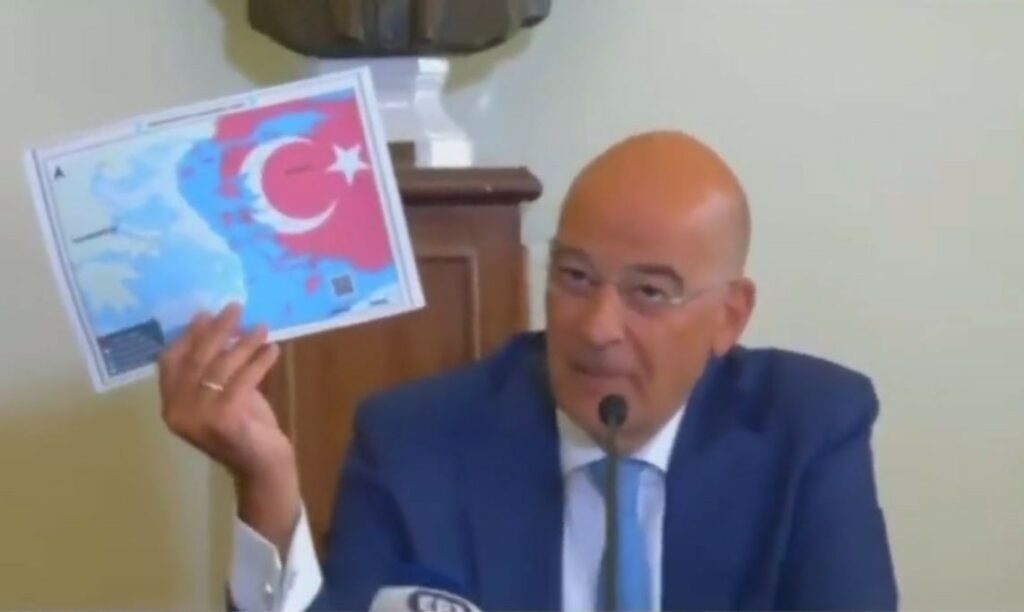
Dendias slams Turkish revisionism, calls on US to support smaller countries based on international law
'This is a Turkish map. You see where the dividing line is and you see that Crete is also coloured red [as Turkish territory]. Now, if Turkey starts from that point of view, how can we ever have a good understanding with Turkey?'
Foreign Minister Nikos Dendias deconstructed Ankara’s revisionist, expansionist policies and threats against Greek sovereignty and outlined the priorities and challenges of Greek foreign policy at a meeting at the foreign ministry today with students and graduates of the Kennedy School of Government.
“This is a Turkish map. You see where the dividing line is and you see that Crete is also coloured red [as Turkish territory]. Now, if Turkey starts from that point of view, how can we ever have a good understanding with Turkey?” Dendias said of Ankara’s neo-Ottoman “Blue Motherland” theory, which claims dozens of Aegean islands and islets and large swathes of Greece’s Exclusive Economic Zone (EEZ) as its own.
‘Continual crisis with Turkey over the last three years’
Dendias underlined that Ankara over the last three years has engaged in unprecedented provocations against Greece [with major crises on land, in 2020, when Turkey unscuccessfully tried to push thousands of migrants in the Evros border region into Greece, and in the Aegean and the Eastern Mediterranean, where in August, 2020, Greece and Turkey reached the verge of a military clash].
“Throughout these three years, we have been experiencing a constant crisis, with vicissitudes, with Turkey, and that has never occurred since 1974 [when Ankara invaded and continues to occupy nearly 40 percent of the territory of the Republic of Cyprus].
Bahceli’s map and Turkish revisionism
Dendias showed the Kennedy School graduates a copy of a map, with all the Greek Aegean islands as well as Crete coloured in red, signifying that they are Turkish territory.
The map was drafted by Turkish President Recep Tayyip Erdogan’s ultra-nationalist coalition partner, the Nationalist Movement Party (MHP), led by Devlet Bahceli, who despite Ankara’s continual provocation has accused the Turkish president as being soft on Greece.
In July, Erdogan and Ahmet Yiğit Yıldırım, the president of the MHP’ Grey Wolves’ Education and Culture Foundation, proudly posed together holding up the framed map.
‘Turkey must accept the International Law of the Sea’
Dendias reiterated Athens’ unswerving position that Greek-Turkish differences must be solved on the basis of international law.
“The problems we have with Turkey and the problems that smaller countries have with larger ones can be solved, but the way to handle them and achieve that is by accepting a common, comprehensive set of rules,” he said.
“These are not rules that we can choose as we like. They are not a la carte rules. They are the rules of international law, and in this case the International Law of the Sea [the 1982 UN Convention on the Law of the Sea, to which Turkey is not a signatory]. If we both accept it as the basis of our discussions, our problems can be solved much more easily.”
Dendias depiction of the geometry of geopolitics
“If we jointly try to solve an exercise in geometry and I employ Euclidian geometry in which there are parallel lines, and you employ elliptical geometry, in which there are no parallel lines, how can we ever solve this exercise together?
US should ‘support medium-sized, small countries based on international law’
Dendias also touched on US-Greece relations, asserting that they are better than ever and that Greece is aligned with American foreign policy as regards a common approach to a rules-based society.
“We believe that revisionist policies, regardless of who the actor is, have no place in the contemporary world. The stronger power cannot impose its views on the weaker one. That is not the world that we have the ambition to build,” he said.
“We are no longer in the 16th century. Humanity for centuries has been struggling to transcend the Machiavellian approach to international politics. What we would like to see on the part of the US is for it to support medium-sized and smaller countries, with a greater involvement in the agenda of international law on the international stage,” said the Greek foreign minister.
Dendias said that such an approach is in the long-term interest of the US, because a main element of American foreign policy over the centuries has been sustaining a rules-based international order, supporting rules and ideals.”
“Why then should we not sign on to such efforts of a country that first established democracy in the world?” he concluded.
Ακολουθήστε το in.gr στο Google News και μάθετε πρώτοι όλες τις ειδήσεις







![Άκρως Ζωδιακό: Τα Do’s και Don’ts στα ζώδια σήμερα [Σάββατο 05.04.2025]](https://www.in.gr/wp-content/uploads/2025/04/rick-hatch-CjU_8O7fFz8-unsplash-1-600x375.jpg)



























![Άκρως Ζωδιακό: Τα Do’s και Don’ts στα ζώδια σήμερα [Σάββατο 05.04.2025]](https://www.in.gr/wp-content/uploads/2025/04/rick-hatch-CjU_8O7fFz8-unsplash-1-315x220.jpg)


















 Αριθμός Πιστοποίησης Μ.Η.Τ.232442
Αριθμός Πιστοποίησης Μ.Η.Τ.232442